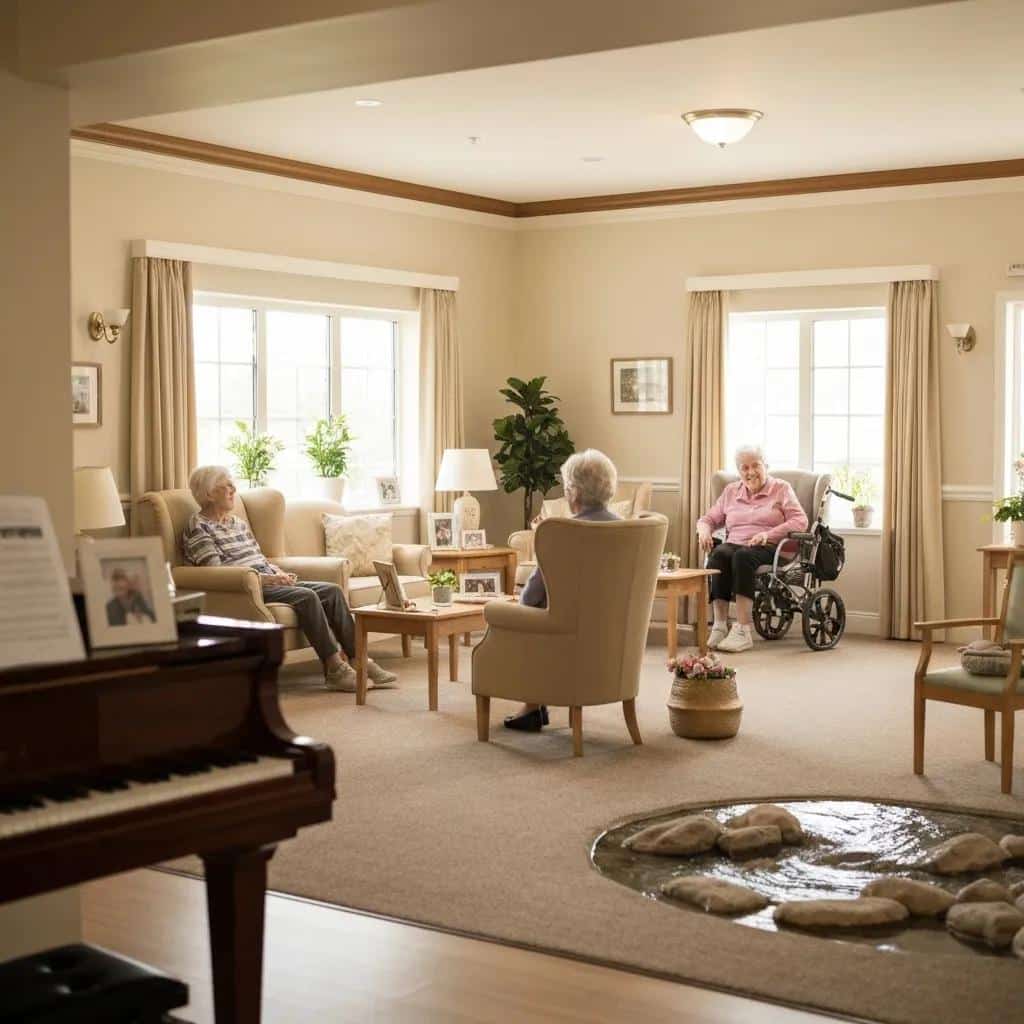Your guide to assisted living Michigan: explore costs, services, financial aid, and top communities for senior care.

Discover Top Memory Care Facilities in Your Area for Seniors
Discover Top Memory Care Facilities in Your Area for Seniors

How to Find the Best Memory Care Facilities Near Me
Finding the right memory care facilities in your area can transform daily life for a loved one living with dementia. With over 190,000 Michigan seniors affected by Alzheimer’s and related conditions, families seek compassionate environments that combine safety, structure, and individualized attention. This guide delivers answers on what memory care involves, how it differs from assisted living, signs a transition may be needed, and a step-by-step checklist for tours. You’ll learn about local costs and financial assistance, explore specialized therapy programs, discover top options in Ypsilanti and Ann Arbor, and prepare your family for a smooth move. By the end, you’ll feel confident in choosing a facility that feels like home while providing expert support for dementia care.
What Is Memory Care and How Does It Differs from Assisted Living?
Memory care is a specialized segment of senior living designed for residents with Alzheimer’s disease or other forms of dementia. By combining secure design features with staff trained in cognitive support, memory care homes improve safety and reduce confusion. In contrast, assisted living emphasizes help with daily tasks but does not always provide the secure environment or activity programming tailored to memory loss.
What Defines Memory Care for Seniors with Dementia?
Memory care refers to residential services that integrate 24/7 supervision, structured routines, and environments designed to minimize wandering risks. Care teams use personalized strategies such as cueing, memory boxes, and sensory engagement to encourage independence and reduce agitation. For example, color-coded hallways and individualized activity plans help residents maintain a sense of familiarity and purpose, directly supporting quality of life.
How Is Memory Care Different from Assisted Living in Ann Arbor and Ypsilanti?
Assisted living and memory care share commonalities like help with bathing and medication, but memory care adds specialized training and safety features. The comparison table below highlights key distinctions:
Memory care’s enhanced safety and focus on cognitive therapies provide an extra layer of support for seniors with dementia, guiding us to the specific types of dementia that benefit most from this approach.
Memory Care vs. Assisted Living – Key Differences
Memory care facilities offer specialized environments with 24/7 supervision and structured routines designed to minimize wandering risks and reduce confusion for individuals with dementia. These facilities often incorporate features like secure entry systems and staff trained in dementia-specific care, which are not always available in assisted living settings.
Alzheimer’s Association, “Memory Care vs. Assisted Living” (2024)
This source provides a comparison of memory care and assisted living, which directly supports the article’s discussion of the differences between the two care options.
Which Types of Dementia Require Specialized Memory Care?
Families should consider specialized memory care when a loved one is diagnosed with a progressive cognitive condition that affects safety and daily function:
- Alzheimer’s Disease is the most common form, characterized by gradual memory loss and confusion requiring structured support.
- Lewy Body Dementia often includes visual hallucinations and fluctuating cognition that benefit from consistent routines.
- Vascular Dementia results from reduced blood flow to the brain, causing executive function decline that specialized staff training can address.
These dementia types involve evolving care needs that memory care homes are uniquely equipped to meet.
What Are the Signs a Loved One Needs Memory Care?
Identifying the signs that a loved one may require memory care can be a challenging yet crucial task, often laden with emotional weight. Generally, noticeable shifts in memory, cognition, and daily functioning serve as primary indicators. Family members may observe increased forgetfulness, such as repeated questions or difficulty recalling recent events. Other signs may include confusion about familiar surroundings or faces, leading to disorientation. Additionally, changes in behavior, like increased irritability, withdrawal from social interactions, or a decline in the ability to manage daily tasks, can further signal the need for specialized care. These changes can sometimes occur gradually, making it essential for family caregivers to remain observant and assess the overall pattern of behavior rather than isolated incidents.
Beyond cognitive challenges, physical health issues may also emerge, compounding the difficulty of daily living. For instance, a loved one may neglect personal hygiene, exhibit weight loss due to poor eating habits, or struggle with managing medications. Such indicators, combined with cognitive decline, can significantly impact the individual’s quality of life and safety. It is essential for families to approach the conversation about memory care with sensitivity and compassion, focusing on the well-being of their loved one while recognizing the signs that it may be time for professional assistance. Early intervention can improve outcomes and provide the necessary support for those experiencing cognitive impairments, ultimately enhancing the quality of life for both the individual and their caregivers.

Recognizing when a senior’s cognitive changes exceed home support is critical. Memory care environments address safety risks and help restore engagement through structured therapies.
What Behavioral and Cognitive Changes Indicate Memory Care Is Needed?
Watching for specific symptoms can guide families toward a care evaluation. Common indicators include:
- Persistent short-term memory lapses that lead to repeated questions or missed appointments.
- Increased episodes of confusion, disorientation, or getting lost in familiar places.
- Sudden agitation, anxiety, or wandering behavior without clear triggers.
These changes often mark a shift from mild forgetfulness to patterns that jeopardize safety.
Declines in daily living abilities further underscore the need for professional support.
How Do Declines in Activities of Daily Living Signal the Need for Memory Care?
When a senior struggles with routine tasks, a secure memory care setting can provide consistency and reassurance:
- Difficulty bathing or managing personal hygiene without prompts.
- Trouble dressing, choosing appropriate clothing, or recognizing seasonal attire.
- Forgetting to take medications or mismanaging dosages.
These functional declines compromise health and well-being, making specialized memory care an increasingly important consideration.
Caregiver stress often intensifies as tasks become more demanding.
How Can Caregiver Burnout Affect the Decision for Memory Care?
Family caregivers may experience exhaustion, emotional strain, and a sense of isolation when supporting a loved one with dementia. Burnout often presents as chronic fatigue, irritability, or neglecting self-care. An experienced memory care community eases this burden by providing trained teams, structured schedules, and supportive resources that ensure both resident and caregiver quality of life improve.
How to Choose the Best Memory Care Facility Near Me: Essential Checklist
Choosing the best memory care facility for a loved one can be a daunting task, as these decisions often come during emotionally challenging times. To make the process smoother, it’s essential to have a clear checklist that addresses crucial factors. First and foremost, prospective clients should consider the facility’s level of care. Look for options that provide specialized services tailored specifically for individuals with memory loss, ensuring that staff members are trained in managing conditions like Alzheimer’s or dementia. Evaluating the facility’s safety features, such as secured entrances, well-designed layouts, and emergency protocols, is equally important to ensure the environment is conducive to both safety and comfort.
Next, it’s crucial to assess the atmosphere and culture of the facility. Prospective families should visit multiple locations to observe interactions between staff and residents, as well as the general ambiance of the place. Facilities that promote social engagement, cognitive stimulation, and physical activities can significantly enhance the quality of life for residents. Additionally, consider factors such as the staff-to-resident ratio and the qualifications of the personnel, as these directly impact the level of individualized attention and care provided. Finally, don’t neglect practicalities like location, cost, and the possibility of transitioning care as needs change. With a thorough checklist, families can make a more informed decision that ensures their loved one receives the support and care they deserve. Selecting a memory care home involves weighing multiple factors to ensure the highest level of support and comfort.
What Key Factors Should Families Consider When Selecting a Memory Care Home?
When evaluating facilities, families should focus on:
- Staff qualifications and dementia-specific training programs.
- Secure design elements such as monitored exits and wander-reduction layouts.
- Caregiver-to-resident ratios that enable personalized attention.
- Life-enriching programs focused on art, music, and cognitive exercises.
- A home-like environment with familiar décor and small household models.
Prioritizing these factors helps families find a community where residents thrive.
What Questions Should You Ask During Facility Tours?
A comprehensive tour should cover all aspects of daily life. Essential questions include:
- How many staff members are on duty per shift and what training do they receive?
- What security measures are used to prevent wandering and elopement?
- How are personalized care plans developed and reviewed?
- What types of therapeutic activities and social programs are offered each day?
- How does the facility handle medical emergencies and coordinate with healthcare providers?
Asking these questions uncovers the true quality of care behind the walls.
How Does a High Caregiver-to-Resident Ratio Improve Memory Care Quality?
A high caregiver-to-resident ratio means more direct engagement and faster response to needs. This structure allows for regular check-ins, one-on-one meaningful activities, and the cultivation of trusting relationships. As caregivers become attuned to individual routines and behaviors, they can preempt triggers for anxiety and confusion, promoting steadier daily rhythms and improved resident well-being.
Why Is a Home-Like Environment Important for Dementia Care?
A home-like setting uses familiar furnishings, personalized décor, and residential floor plans to reduce stress and support memory cues. Living in a small household with kitchens, comfortable common rooms, and secure gardens recreates a family atmosphere. This familiarity eases transitions, encourages participation in daily life, and strengthens emotional connections.
What Is the Cost of Memory Care in Ypsilanti and Ann Arbor?
When considering memory care options in Ypsilanti and Ann Arbor, families are often confronted with the important question of cost. Memory care facilities typically offer specialized services for individuals with Alzheimer’s disease, dementia, and other cognitive impairments, which can significantly enhance the quality of life for residents. In these areas, the cost of memory care can vary widely based on several factors, including the location of the facility, the level of care required, and the amenities offered. Generally, Ypsilanti tends to present slightly lower prices than its neighbor Ann Arbor, though both locations reflect a regional trend of increasing costs in long-term care.
On average, families can expect to pay anywhere from $4,500 to $7,500 per month for memory care in this region. This price point often includes 24-hour supervision, assistance with daily activities, and specialized programs designed to stimulate cognitive function. Additionally, some facilities may charge extra fees for personalized care services or enhanced amenities, such as private rooms or gourmet dining options. When evaluating memory care costs, it is crucial for families to consider not only their budget but also the specific needs of their loved ones, as the right environment can make a significant difference in their overall well-being and safety. Understanding the financial implications of memory care is essential for making informed decisions that align with both emotional and economic considerations. Understanding typical fees and assistance programs helps families plan for the financial aspects of memory care.
What Are the Average Memory Care Costs in Michigan and Local Areas?
Below is a breakdown of monthly costs for memory care in Michigan compared to national averages:
Costs vary by community size and program offerings, guiding families toward transparent budgeting.
How Does Memory Lane Home’s All-Inclusive Pricing Compare?
Memory Lane Home offers a single monthly fee that covers room, board, toiletries, meals, medication management, secured environment, and all therapy programs. By eliminating hidden fees, this structure simplifies financial planning and ensures families know precisely what to expect every month.
What Financial Assistance Options Are Available for Memory Care?
Families can explore several funding sources to offset costs:
- Medicaid waiver programs such as the MI Choice Waiver, which may cover select therapeutic services.
- Veterans Affairs Aid & Attendance benefits for eligible former service members and spouses.
- Long-term care insurance policies that include memory care riders.
Financial Assistance for Memory Care
Families can explore various financial assistance options to help cover the costs of memory care, including Medicaid waiver programs, Veterans Affairs Aid & Attendance benefits, and long-term care insurance. These resources can help offset the expenses associated with memory care, making it more accessible for those in need.
U.S. Department of Veterans Affairs, “Aid & Attendance and Housebound” (2024)
This citation supports the article’s information on financial assistance options, specifically mentioning Veterans Affairs benefits, which is a key point in the article.
What Does Medicaid Cover and What Are Its Limitations for Memory Care?
Medicaid in Michigan offers a waiver program that finances nursing and therapy services within memory care but does not cover room-and-board charges. Eligibility criteria include income limits and documented medical need. Families should plan for the portion of monthly fees not funded by Medicaid to avoid unexpected gaps.
What Specialized Dementia Care Programs and Activities Are Offered at Top Facilities?
Specialized dementia care programs and activities offered at top facilities are designed to address the unique needs of individuals living with various forms of cognitive decline, such as Alzheimer’s disease. These programs typically incorporate evidence-based approaches that emphasize personal engagement, cognitive stimulation, and emotional support. Facilities often employ trained staff who understand the complexities of dementia, enabling them to create a nurturing environment that fosters residents’ independence while ensuring their safety. Group activities, including art therapy, music therapy, and sensory stimulation exercises, are common in such programs, as these activities can enhance mood, promote social interaction, and improve overall well-being.
In addition to structured programming, many top dementia care facilities offer individualized care plans tailored to each resident’s specific needs and preferences. This personalized approach can include one-on-one memory activities, life skills training, and physical exercises designed to strengthen cognitive function and maintain mobility. Furthermore, top-tier facilities may utilize technology, such as virtual reality and cognitive games, to provide stimulating experiences that resonate with residents. Ultimately, the combination of specialized programs, individualized attention, and engaging activities contributes to a holistic approach to dementia care, aiming to enhance the quality of life for both residents and their families. Engaging programs designed for cognitive and emotional support form the heart of quality memory care.
How Do Therapeutic Activities Like Music and Art Therapy Benefit Residents?
Music and art therapy offer sensory stimulation that taps into long-term memory pathways. By singing familiar songs or creating simple crafts, residents improve mood, reduce agitation, and strengthen neural connections. For instance, group drumming circles can enhance social interaction while individual painting sessions spark creativity and self-expression.
What Are Personalized Care Plans and How Do They Support Residents?
Each resident’s history, routines, and preferences inform a customized care plan that outlines daily schedules, cognitive goals, and physical activities. These plans may include memory prompts using family photos, tailored exercise regimens, or favorite mealtime menus. Personalized plans ensure that every intervention aligns with individual strengths and life stories.
How Do Consistent Care Teams Enhance Memory Care Outcomes?
When the same caregivers work with residents over time, they develop deep insights into behaviors, triggers, and effective calming techniques. This continuity fosters trust, reduces anxiety, and supports earlier recognition of health changes. A familiar face at each shift strengthens resident confidence and communication.
What Role Do Daily Routines and Cognitive Engagement Play in Memory Care?
A structured daily schedule balances rest, physical movement, and brain-stimulating tasks to reinforce memory pathways. Activities like simple puzzles, guided gardening, and reminiscence sessions help maintain cognitive function. Consistent routines also offer predictability that lowers stress and enhances quality of life.
Where Are the Best Memory Care Facilities Located in Ypsilanti and Ann Arbor?
When searching for the best memory care facilities in Ypsilanti and Ann Arbor, it is important to consider a variety of factors including the quality of care, staff qualifications, and the environment provided for residents. These two neighboring cities in Michigan are home to several reputable facilities that prioritize the needs of individuals with memory-related conditions such as Alzheimer’s and dementia. Ypsilanti’s memory care options benefit from its community-oriented atmosphere, offering personalized care in a comfortable setting. Facilities in this area often feature well-trained staff, engaging activities, and therapeutic programs designed to enhance the quality of life for residents.
On the other hand, Ann Arbor boasts a variety of memory care facilities that are often praised for their innovative approaches and state-of-the-art services. Known for its educational institutions and vibrant cultural scene, Ann Arbor’s facilities tend to integrate a holistic approach to care, incorporating cognitive therapies and activities that promote mental engagement. Families seeking memory care options in both cities will find a variety of choices, each with unique amenities and levels of care, ensuring that they can find a facility that best matches the specific needs of their loved ones. Overall, both Ypsilanti and Ann Arbor provide commendable memory care options, enhancing the well-being of residents in a supportive and nurturing environment. Local communities offer specialized centers and support networks for families navigating dementia care.
What Local Resources Support Families Seeking Memory Care?
Families can tap into community services such as:
- Detroit Chapter of the Alzheimer’s Association for education and caregiver support groups.
- Area Agency on Aging 1-B offering counseling, care planning, and respite programs.
- Local faith-based organizations that host memory cafés and social activities.
These resources provide information, emotional support, and practical guidance.
How Does Memory Lane Home Stand Out Among Local Memory Care Providers?
Memory Lane Home delivers specialized care in six-bed ranch houses that replicate a family household. A high caregiver-to-resident ratio, transparent all-inclusive pricing, and licensed dementia-trained staff set it apart. Enriching programs, secure outdoor gardens, and personalized memory cues create a warm, homelike atmosphere while ensuring expert oversight at every moment.
What Are the Benefits of Choosing a Memory Care Facility Near Me?
Proximity fosters regular family visits, easier coordination with local physicians, and access to familiar community programs. Staying close to established social networks helps residents maintain connections, while families benefit from reduced travel stress and timely involvement in care decisions.
How Can Families Prepare for Transitioning a Loved One to Memory Care?
Transitioning a loved one to memory care can be a complex and emotional process for families. Many families find themselves grappling with the best approach to support their loved one while also ensuring they receive the care necessary for their unique needs. One of the first steps in preparing for this transition is to have open, honest conversations about the changes that are about to take place. Engaging in a dialogue about the benefits of memory care, as well as addressing any fears or misconceptions, can help ease anxiety for both the individual and their family members. It is also essential to involve the loved one in the discussion as much as possible, allowing them to express their feelings and preferences regarding the transition.
In addition to communication, families should take practical steps to ensure a smooth transition. This includes researching memory care facilities thoroughly, visiting potential locations, and evaluating the staff, services, and environment to find the best match for their loved one. Families may also benefit from creating a care plan that outlines their loved one’s specific needs, preferences, and daily routines, which can help caregivers provide tailored support. Additionally, preparing emotionally for the transition is vital; families may consider seeking support groups or counseling to navigate their feelings and share experiences with others facing similar challenges. Ultimately, a proactive approach—combining open communication, careful planning, and emotional support—can help families make this difficult transition more manageable for everyone involved.

A thoughtful transition plan supports emotional well-being and sets clear expectations.
What Are the Steps to Research and Tour Memory Care Facilities?
- Assess your loved one’s cognitive and physical needs with a healthcare professional.
- Compile a list of local memory care homes and review online ratings and testimonials.
- Schedule in-person tours during mealtime and activity hours to observe real-world routines.
- Evaluate staff interactions, safety features, and cleanliness during visits.
- Compare services, pricing models, and move-in availability before making a decision.
Following these steps ensures an informed choice.
How Can Families Support Loved Ones During the Transition?
During periods of transition, whether it be a significant life change, health decline, or relocation, family members play a critical role in providing support and stability to their loved ones. The process can be emotionally taxing, but families can enhance their loved ones’ experience by fostering open communication and creating a nurturing environment. Listening attentively to concerns and feelings allows individuals to feel validated and understood, which is essential for emotional well-being. Moreover, expressing empathy and offering reassurance can fortify personal bonds, encouraging loved ones to navigate their transitions with greater confidence. Communicate openly about upcoming changes, involve the senior in room personalization, and bring familiar belongings to create comfort. Establish visit schedules and maintain daily phone or video check-ins. Celebrating small milestones—like a resident’s first meal in the dining room—reinforces positivity and eases adjustment.
What Should Families Expect in Terms of Care and Daily Life at Memory Care Homes?
Residents typically follow a balanced routine of personal care, cognitive and social activities, and nutritious meals. Care teams conduct regular wellness checks, administer medications safely, and adjust therapies as needs evolve. Families should anticipate open communication from staff about health updates and participation in care-plan reviews. As you explore memory care options, reach out to Memory Lane Home to learn how its homelike model and dedicated team can support your family’s journey toward safety, engagement, and comfort. Contact Memory Lane Home for a personalized consultation and tour to discover why it stands among the best memory care facilities in your area.
Frequently Asked Questions
What Should Families Know About the Admission Process for Memory Care Facilities?
The admission process for memory care facilities typically involves several steps to ensure the right fit for both the resident and the facility. Families should expect to provide medical history, undergo assessments to evaluate cognitive and physical needs, and participate in interviews with staff. This process helps determine the level of care required and allows families to ask questions about the facility’s approach to memory care. It’s essential to understand the policies regarding deposits, trial periods, and any required documentation before finalizing the admission.
How Can Families Evaluate the Quality of Care in Memory Care Facilities?
Evaluating the quality of care in memory care facilities involves observing several key factors. Families should look for staff-to-resident ratios, staff qualifications, and the training provided in dementia care. Additionally, visiting during different times of the day can reveal how staff interacts with residents and the overall atmosphere of the facility. Checking for cleanliness, safety features, and the availability of engaging activities can also provide insights into the quality of care. Reviews from other families and accreditation from relevant organizations can further guide your evaluation.
What Role Do Family Visits Play in the Well-Being of Residents in Memory Care?
Family visits are crucial for the emotional well-being of residents in memory care facilities. Regular visits help maintain connections and provide a sense of familiarity, which can reduce feelings of isolation and anxiety. Engaging in activities together, such as sharing meals or participating in events, reinforces relationships and encourages residents to engage with their surroundings. Families should establish a consistent visiting schedule to help residents feel secure and supported, which can significantly enhance their overall quality of life in memory care.
What Are the Common Misconceptions About Memory Care Facilities?
Common misconceptions about memory care facilities include the belief that they are merely nursing homes or that they lack engaging activities. In reality, memory care facilities are designed specifically for individuals with dementia, offering structured environments and specialized programs that promote cognitive engagement and emotional support. Another misconception is that residents lose their independence; however, many facilities focus on enhancing autonomy through personalized care plans and activities that encourage participation. Understanding these differences can help families make informed decisions about care options.
How Can Families Stay Involved in Their Loved One’s Care in Memory Care Facilities?
Staying involved in a loved one’s care in memory care facilities is essential for both the resident and the family. Families can participate in care plan meetings, provide input on personal preferences, and engage in regular communication with staff about their loved one’s progress. Visiting frequently and participating in facility activities can also strengthen bonds and provide emotional support. Additionally, families should advocate for their loved one’s needs and preferences, ensuring that the care provided aligns with their values and expectations.
What Should Families Do If They Are Unsatisfied with the Care Provided?
If families are unsatisfied with the care provided in a memory care facility, it is important to address concerns promptly. Start by discussing specific issues with the facility’s management or care team to seek resolution. Documenting incidents and maintaining open communication can help clarify misunderstandings. If concerns persist, families may consider filing a formal complaint with state regulatory agencies or seeking alternative care options. Prioritizing the well-being of the resident is crucial, and families should feel empowered to advocate for the best care possible.


